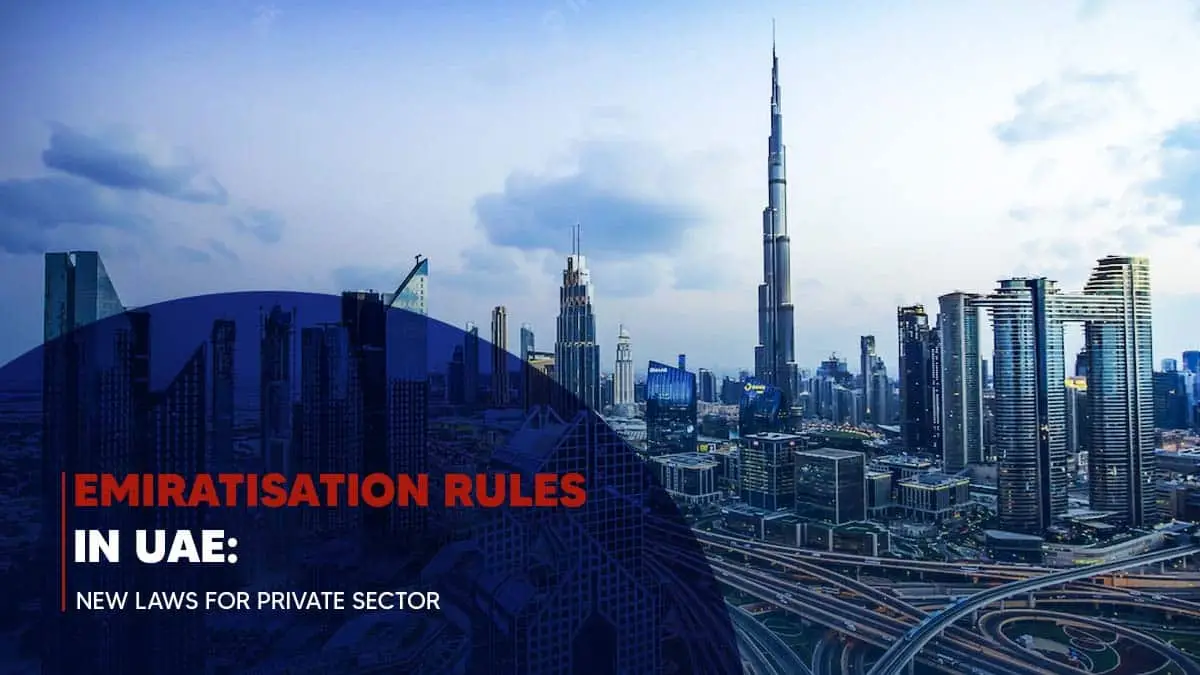The government has long since implemented regulations to increase Emiratisation in the UAE workforce. The key objective has been to increase the participation of UAE nationals in private-sector jobs.
According to the new UAE Emiratisation Law 2024, private-sector employers (50+ Employees) must achieve a minimum of 2% year-on-year growth in their Emirati workforce for skilled positions. This translates to roughly one Emirati employee for every 50 skilled workers. These laws, specifically Ministerial Decision No. 279 of 2022, will definitely impact the organisational policies and recruitment strategies of businesses.
These resolutions are a part of Nafis, a “governmental federal program which aims to increase the competitiveness of Emirati human resources & empower them to occupy jobs in the United Arab Emirates’ private sector over the next five years.” The program aims to create over 12 thousand annual job opportunities for Emirati citizens covering all economic sectors.
The UAE government also targeting a 10% Emiratisation increase in skilled professions by 2026.
What is Emiratisation?
Emiratisation is a government initiative in the United Arab Emirates (UAE) aimed at increasing the number of Emirati citizens working in both the public and private sectors. It essentially focuses on boosting Emirati employment rates.
- By creating more job opportunities for Emiratis, the initiative aims to bring down unemployment among them.
- A strong Emirati workforce is seen as crucial for the UAE’s long-term economic growth and stability.
- The program also seeks to strengthen Emirati identity and cultural preservation by promoting their involvement in the nation’s development.
The UAE government actively supports Emirati employment through a variety of initiatives. It aims to equip Emiratis with the necessary skills, encourage companies to hire them, and create a legal framework that promotes Emirati employment in both the public and private sectors.
Changes to the Emiratisation Laws
According to the regulations shared by the UAE government, also given below are the changes in the legislation that are coming into force:
- Ministerial Decision No, 279 of 2022 – Emiratisation in the private sector (2% Emiratisation Law)
- Cabinet Decision No. 18 of 2022 (Classification Law)
- New rules governing benefits under the Nafis scheme
Requirements of the 2% Emiratisation Law in UAE
The Emiratisation rules state that if a private company has 50 employees or less on their payroll, they need to have 1 Emirati, and additionally, if the company has a headcount of 51 to 100 employees, they need to have 2 Emiratis on their payroll.
Companies registered with MoHRE in Mainland with 50 or more employees must achieve a 2% annual increase in the number of Emirati nationals employed in skilled positions compared to their total skilled workforce.
The Emiratisation law doesn’t directly state a specific number of Emirati hires. Instead, it establishes a tiered system based on the total number of skilled workers in the company:
- 50 skilled workers: minimum 1 Emirati employee
- 51-100 skilled workers: minimum 2 Emirati employees
- 101-150 skilled workers: minimum 3 Emirati employees
- 151 & above: 1 Emirati employee for every 50 or less workers
What constitutes “Skilled Workers”
The Ministry of Human Resources and Emiratisation (MoHRE) defines skilled workers as employees that:
1. Belong to any of these 5 worker categories:
- Legislators, managers, business executives
- Professionals in scientific, technical & humanitarian fields
- Technicians in scientific, technical and humanitarian fields
- Writing professionals
2. Service & sales occupations
3. Having a secondary school certificate is equal or higher
4. Relevant authority attested worker’s certificate
5. Monthly salary of no less than AED 4,000
Emiratisation Laws for Smaller Businesses
Previously, only private companies with 50 or more employees had Emiratisation targets. Now, smaller & medium companies with 20-49 employees must also participate. These companies need to hire one Emirati citizen in 2024 and another in 2025. Failing to meet these targets will result in fines.
The ultimate goal is to have at least 10% of the skilled workforce in the private sector be Emirati nationals by 2026. Companies can utilize resources like the National Program for Employing Emiratis (NAFIS) to find qualified Emirati candidates.
Penalties for Non-Compliance
Companies that fail to fulfil the requirements of the Emiratisation program will have to fulfil the following penalties:
- A minimum fine of AED 6,000 per month in lieu of each Emirati employee not hired. This amount will increase by AED 1,000 annually until 2026. As a result, failure to pay the fines can lead to the suspension of work permit applications by the company.
- In case a company fails to comply with their Emiratisation quotas for two consecutive years, it will be demoted to the third category under the Classification Law.
- Companies caught engaging in fake Emiratisation can face fines ranging from a minimum of AED 20,000 to a maximum of AED 100,000 per employee involved in the scheme.
UAE authorities have made stringent announcements to pursue non-compliant companies. The entities themselves can expect to suffer financial & reputational implications should they show consistent complacency towards hiring UAE nationals.
Stay updated with the Shuraa Business Setup
With the UAE opening its doors to a steady influx of foreign investors, it has become imperative for companies to stay updated with the necessary laws and regulations to ensure the smooth running of their business. Once they fulfil the basic requirements of the 2% Emiratisation Law in UAE, they will be free to pursue their commercial interests along with gaining access to the inner sanctum of UAE’s national community.
Shuraa Business Setup is UAE’s leading company formation consultancy that offers expert PRO services to investors. If your company is seeking information on the latest UAE corporate updates, our experts will guide you through the entire process.
Reach out to us at +97144081900 or send us a WhatsApp message at +971507775554. You can also drop an email at [email protected] and get answers to all your queries.







